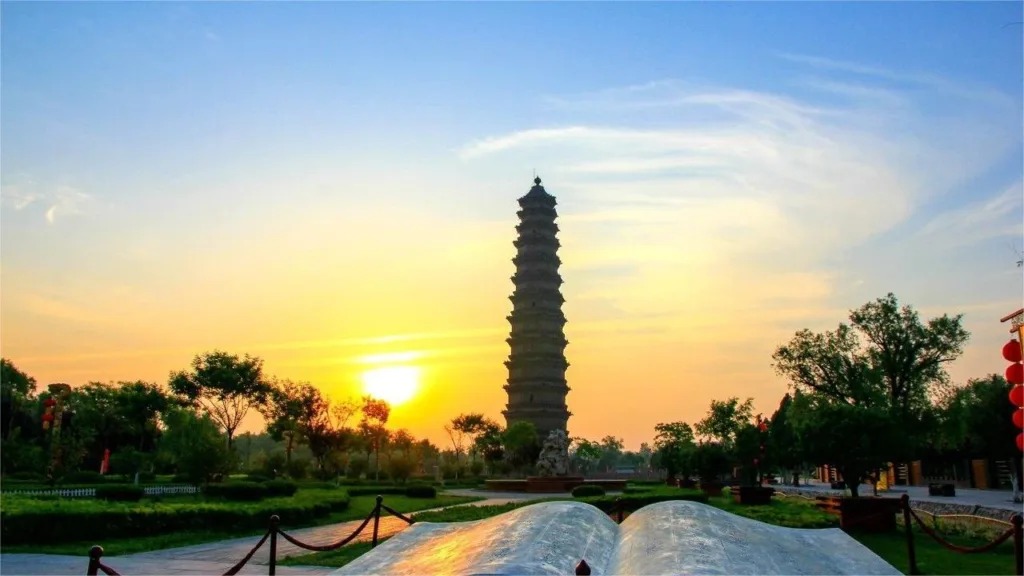Dragon Pavilion Park (Longting Park, 龙亭公园), located in Kaifeng City, Henan Province, is a historic architectural complex modeled after the layout of the Qing Dynasty’s Palace of Ten Thousand Longevities. Its history dates back to the Tang Dynasty when it served as a regional government office. Subsequently, during the Five Dynasties period, it was transformed into an imperial palace by the Later Liang, Later Jin, Later Han, and Later Zhou dynasties. In the Northern Song Dynasty, Dragon Pavilion Park became the location of the cenral government. During the Kangxi reign of the Qing Dynasty, a pavilion called the Pavilion of Ten Thousand Longevities was constructed here, later renamed “Dragon Pavilion” as officials often came here to pay respects. In the Republican era, it was officially named “Dragon Pavilion Park.”
The park features a unique architectural layout, stretching from south to north and consisting of the Meridian Gate (the south gate of the scenic area), the Jade Belt Bridge, Song Hu, the Morning Gate, the Screen Wall, the Dragon Pavilion Hall, the Song Dynasty Wax Museum, the east and west Hanging Flower Gates, the east and west Cross Courtyards, the model of the Northern Song Dynasty’s capital and imperial city, the site of the Northern Song Dynasty’s imperial city’s Gongchen Gate, and the east convenient gate.
Table of Contents
- Basic Information
- Location and Transportation
- Highlights of Dragon Pavilion Park
- Vlog about Dragon Pavilion Park
- Attractions near Dragon Pavilion Park
Basic Information
| Estimated Length of Tour | 2 hours |
| Ticket Price | 45 RMB |
| Opening Hours | 8.00 – 18.00; Last admission: 17.30 |
| Telephone Number | 0086-0371-22198151 |
Location and Transportation
Dragon Pavilion Park is situated at the intersection of Songdu Yujie and Longting West Road in Longting District, Kaifeng City, Henan Province, China. To get there, you can take bus 1, 11, 14, 15, 18, 21, 30, 31, 34, 37, 47, K101, or Y302 and get off at Xinjiekou Stop (新街口站).
Highlights of Dragon Pavilion Park
Dragon Pavilion Hall

The centerpiece of the park, Dragon Pavilion Hall, stands majestically atop a platform of 72 steps. Facing north, the hall is adorned with a magnificent imperial road carved from blue stones, featuring intricately coiled dragons. Remarkably, the stone carvings still bear the hoof prints of Zhao Kuangyin, the founding emperor of the Northern Song Dynasty. Rising 26.7 meters high and measuring 19.10 meters in length and 11.90 meters in width, the hall boasts a celestial ceiling adorned with intricate cloud dragon patterns. Its soaring eaves, adorned with wind chimes, create a melodious atmosphere as they sway in the breeze. In front of the Dragon Pavilion, a straight pathway leads to two lakes, Panjia Lake to the east and Yangjia Lake to the west.
Wax Museum

Located within the side halls of Dragon Pavilion Park is the Wax Museum, which offers a fascinating insight into the history of the Song Dynasty. The museum showcases nine sets of wax figures depicting significant political, economic, and cultural events during the reigns of nine emperors of the Northern Song Dynasty. Each wax figure is meticulously crafted to reflect historical accuracy. Particularly noteworthy is a set of wax figures depicting the Reform of Wang Anshi, featuring three central characters. Emperor Shenzong of the Northern Song Dynasty, Zhao Xu, is seated in the central imperial throne, attired in a light yellow dragon robe with a red jade belt. He gazes intently at the minister seated to his left, Wang Anshi, who advocated for reform. On the opposite side sits another minister, Sima Guang, who opposed the reform, depicted in a contemplative pose.
Various Greenspaces

Dragon Pavilion Park features a variety of highlights, including the Botanical Sculpture Garden, Bonsai Garden, Plum Garden, and picturesque landscapes. The Botanical Sculpture Garden showcases intricately shaped animal figures made from plants such as cypress and juniper, as well as unique models like airplanes, trains, and towers. It also incorporates themes from Chinese stories like “Journey to the West” and “Three Pools Mirroring the Moon,” making it a distinctive and vibrant botanical attraction known as the “Unique Wonder of Central China.” The Bonsai Garden, also known as the Fragrant Grove, offers a tranquil setting for admiring bonsai trees, with hundreds of bonsai specimens, including tree stump and landscape styles. These exquisite bonsai, along with the skillful arrangement of garden rocks, water features, and flower trellises, create a serene and enchanting atmosphere that captivates visitors and invites them to linger and appreciate the beauty of nature.






